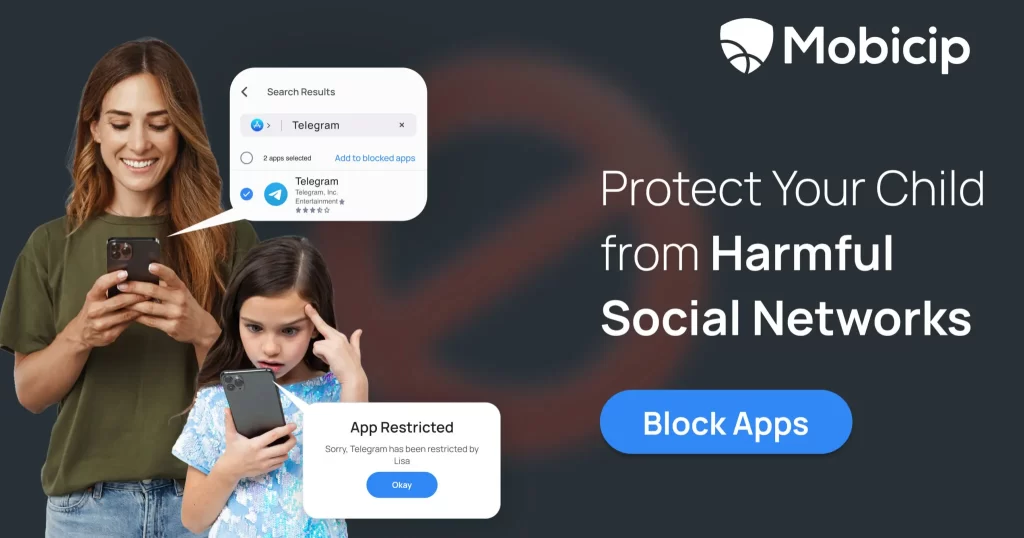Everything You Need to Know About the Latest Telegram App Controversy

The Telegram controversy has sparked global debate after serious allegations raised concerns about the app’s safety, privacy policies, and lack of content moderation. Telegram is a popular instant messaging app that lets users connect with friends, family, and even strangers across Android, iOS, and desktop platforms.
Telegram is continuously growing, with 950 million people using it every month in 2024. It is one of the top messaging apps worldwide, ranking 8th globally and 4th in the U.S.
Telegram provides social networking features also, such as the option to post stories and create large public groups with a capacity of up to 200,000 members. Also, users can share one-way updates with unlimited audiences through channels.
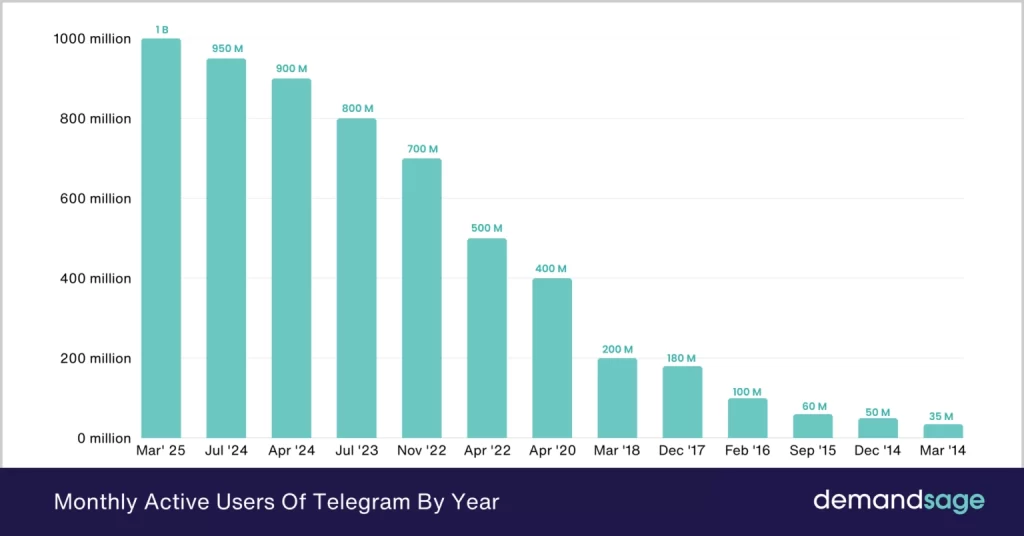
Average Monthly Active Users of Telegram
Source: DemandSage
Key Features of the Telegram App
Fast messaging: Telegram sends messages quickly, even on slow connections.
Cloud-based: You can access your chats from any device, like your phone, tablet, or computer.
Large file sharing: Share files up to 2 GB each, whether it’s videos, documents, or pictures.
Groups and channels: Create groups for up to 200,000 people or broadcast messages to large audiences using channels.
Voice and video call: High-quality voice and video calls are available.
Secret Chats: Messages in Secret Chats are encrypted directly between the sender and receiver. No one else, not even Telegram, can read them. Secret Chats can only be accessed on the device they were started on.
Self-destructing messages: You can set a timer ranging from 2 seconds to a week to make your messages disappear after the defined period.
Bots: Automated tools (AI bots) can help with tasks, play games, or provide services within Telegram.
People Nearby: You can find and chat with people around you without sharing your exact location. You can also join local groups that are based in your area.
The Latest Telegram Controversy Explained
The Arrest of Telegram CEO and the Growing Telegram Controversy
On August 25th, Telegram CEO Pavel Durov, a billionaire born in Russia and now holding French and Dubai citizenship, was arrested in France. The Telegram controversy intensified after the arrest of its CEO, raising serious concerns about how the platform is being misused. The charges, brought by French prosecutor Laure Beccuau, include serious accusations. They range from helping in the distribution of child pornography to arms and drug trafficking and fraud. Authorities claim that Telegram’s lack of moderation enabled these illegal activities. While Telegram’s encryption and privacy features are often praised for protecting users’ privacy, they’ve also allegedly allowed criminals to avoid detection and misuse the platform.
The Aftermath of the Arrest and Its Role in the Telegram Controversy
This Telegram controversy has triggered global discussions about privacy, accountability, and platform responsibility. After spending four days in custody, Pavel Durov appeared in court and was released on a 5 million euro bail. Though he is now out of custody, the legal process is still ongoing. Durov has been ordered to stay in France while the investigation continues into Telegram’s potential role in facilitating criminal activities. This case is part of a larger global debate. It highlights the responsibility of tech companies to monitor the content on their platforms.
The internet is split over Durov’s arrest. Some prominent tech leaders have rallied behind him, defending freedom of speech. But for many governments—and especially for parents like us—the lack of content moderation and total secrecy is alarming. It stops us from seeing what our children do online or preventing them from getting into dangerous situations.
Key Issues Highlighted by the Telegram Controversy
Telegram: A Hub for Explicit Content
One of the biggest concerns with Telegram is the presence of inappropriate content. At the center of the Telegram controversy is the platform’s limited content moderation and strict privacy stance. Because the platform focuses so much on privacy, some people misuse it to share harmful material, including:
- Explicit content
- Violent or extreme videos
- Drugs, Arms related conversations
- Sexting
- Pornography
Stumbling upon such content can be dangerous for children and teenagers. It’s easy for them to join public or private channels where inappropriate material is shared, and parents may not even be aware of it.
Exposure to explicit content can seriously impact their mental health, encourage risky behavior, or make them vulnerable to online predators. As a parent, this is definitely something to be worried about.
Telegram’s guidelines do ban the public sharing of pornographic content, but this rule doesn’t apply to private groups and chats. Strangers could even start inappropriate conversations, like sexting, without the app banning it. Kids are also at risk of encountering violent or disturbing posts which are clearly unsuitable for them.
In private groups and chats, there are discussions around dangerous topics like human trafficking, drugs, arms trafficking, and even the distribution of child pornography.
Telegram functions similarly to WhatsApp and has added privacy features like end-to-end encrypted ‘Secret Chats’ and self-destructing messages. Unfortunately, these features allow people with bad intentions to communicate and share harmful content without the fear of being caught.
Telegram’s strict privacy measures make it hard for authorities to monitor or stop illegal activities like the sharing of explicit content. This raises concerns for parents. You may wonder, “Is my child truly safe if I can’t monitor what’s happening in their private chats?” While it’s important to protect our kids’ privacy, we also need to make sure they are safe, which is where things get tricky.
Telegram: A Hub for Terrorism and Criminals
Telegram is known for its strong stance on privacy. It uses encryption to ensure that messages are secure and can’t be read by just anyone—not even the app itself can access the conversations. The Telegram controversy highlights how unrestricted private groups can expose children to harmful material. While this sounds great for keeping personal conversations private, it also creates challenges.
“Telegram is the most popular place for ill-intentioned, violent actors to congregate. If you’re a bad guy, that’s where you will land”
– Rebecca Weiner, the deputy commissioner for intelligence and counterterrorism at the New York Police Department.
Because Telegram’s privacy measures are so strict, it has become a hub for illegal activities and has attracted extremist groups and criminals. In 2015, the Islamic State (ISIS) used Telegram to coordinate its actions, spread propaganda, and recruit new members. They even set up tech support channels to help members avoid detection.
Initially, Telegram’s CEO, Pavel Durov, refused to shut down these channels, stating that protecting users’ privacy was more important than fearing terrorism. However, after the Paris attacks in November 2015, he changed his stance. Telegram then began shutting down public ISIS channels and took steps to monitor for terrorist activity.
Despite these efforts, illegal activities continue on the platform. Other extremist groups, such as far-right organizations and conspiracy theorists, have also found a place on Telegram, allowing them to communicate and organize with minimal oversight. The app frequently appears in the news due to various criminal activities occurring through its platform. We can rightly say that Telegram’s absolute unwillingness to track down and prevent illegal activities has made it the “most loved app” among various terrorist groups involved in violent crimes
For more on Telegram: Read our blog Is Telegram Safe For Kids?
How Parents Can Protect Their Children Amid the Telegram Controversy
Educate Your Child
As parents, we need to be involved in our children’s lives, especially when it comes to their online activities. Take the time to have meaningful conversations. Ask them questions like, “Hey, do you know what Telegram is? Have you used it before? Did you hear about the recent arrest of its CEO?” This can lead to a discussion about why Telegram might not be safe. You can say, “This app has had some bad press. Would you like to know why?”
Sometimes, ignorance isn’t bliss. It’s important to explain why Telegram isn’t safe and what kind of risks it poses. Make sure the conversation goes both ways—let your child share their thoughts, too. Open dialogue builds trust and helps them understand why you’re concerned.
Set Clear Boundaries
Telegram’s terms of service say users should be at least 16 years old. We think that’s a good rule to follow. If your child is under 16, they shouldn’t be using the app—simple as that. Explain the reasons behind this and make sure they understand.
If your teen is over 16 and you believe they’re mature enough to handle it, you can consider allowing them to use Telegram—but with clear rules. Help them set up the app’s privacy features and discuss the boundaries you expect them to follow. It might be a good idea to create a “digital plan” with your teen so they know exactly what the expectations are
Block Telegram App and Websites
Sometimes, apps like Telegram can be secretly downloaded without your knowledge. That’s why it’s important to use parental control tools like Mobicip. Mobicip offers strong protection not just for apps like Telegram but also for harmful websites, inappropriate content, and screen time management.
Here’s what Mobicip can help you do:
App Blocker – Block dangerous apps like Telegram completely.
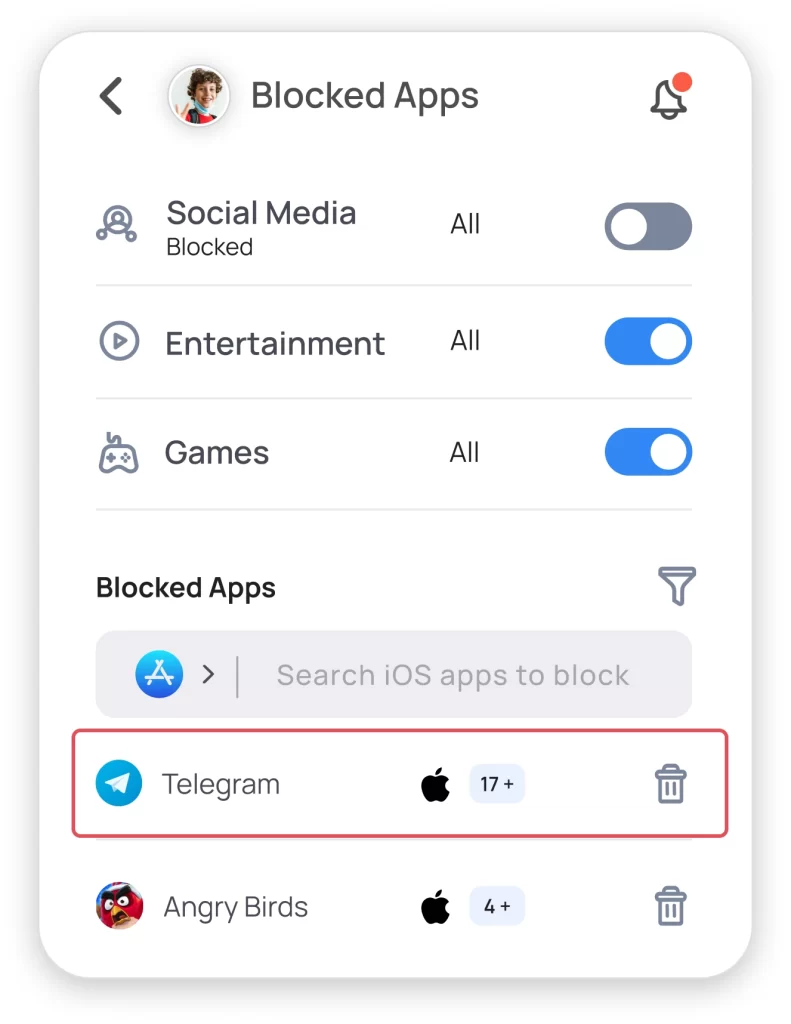
Notifications – Get alerts when your child tries to download restricted apps like Telegram.
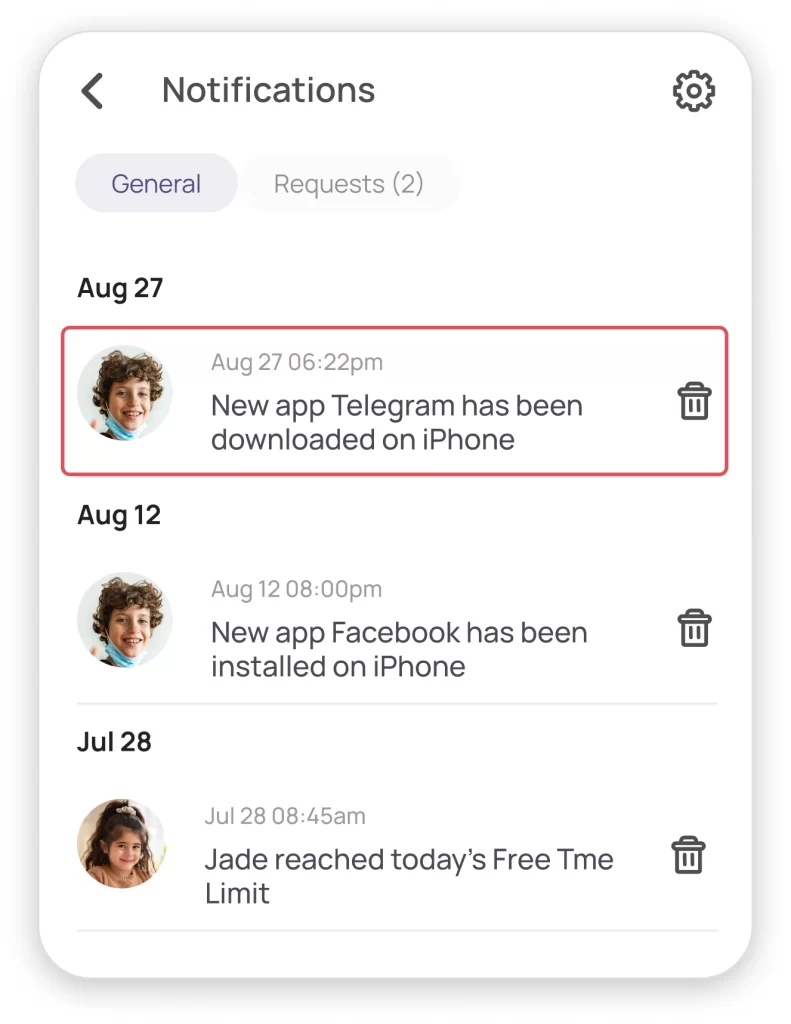
Social Media Monitor – Get notified if something violent shows up on your child’s social media.

Content Filtering – Block age-inappropriate websites and over 20 web categories. You can also blocklist specific websites to permanently block dangerous content.
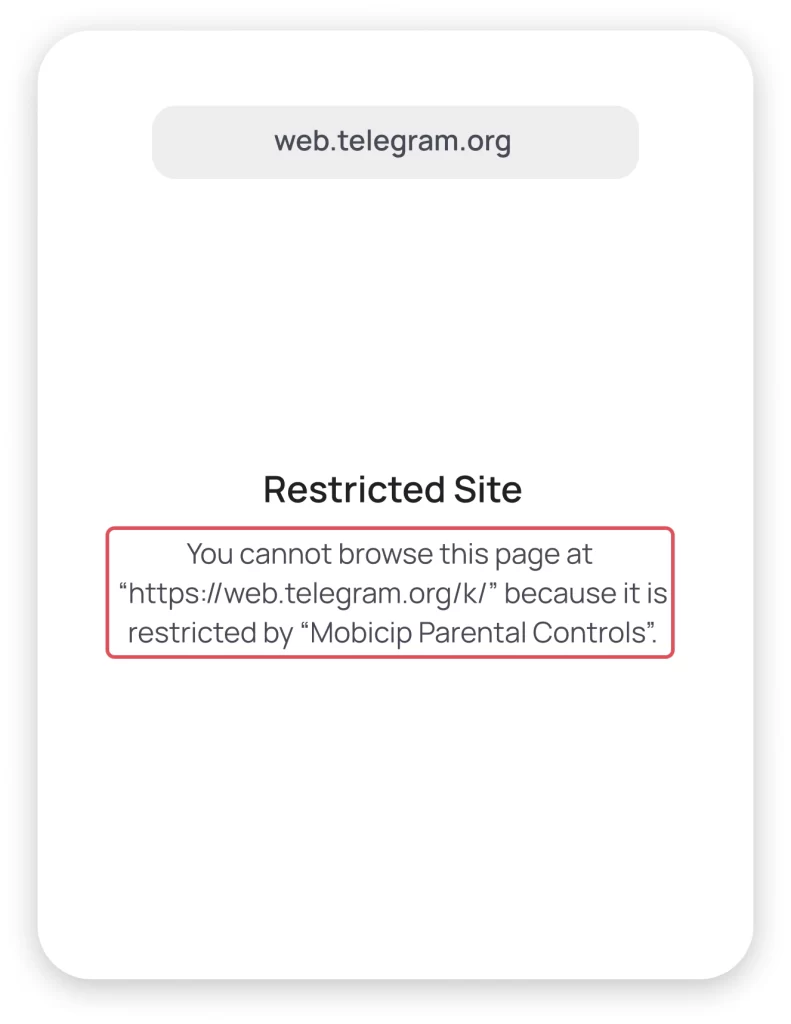
The Telegram controversy is more than just a legal battle—it’s a reminder for all of us, especially parents, to be aware of what our kids are exposed to online. Managing children’s online activities puts us in a tough spot. We want to respect our children’s right to privacy, but we also have a duty to protect them from harm. This balance between privacy and security isn’t just a technical issue for companies like Telegram—it’s something we deal with in our own homes too. While it’s important to protect our children’s privacy, their safety should always come first.
For many of us who are working, have house work or a toddler to manage, it might be impossible to monitor our children every moment. Still, we can take proactive steps to protect them. Start by having open conversations, setting boundaries, and using tools like Mobicip for extra protection.
Mobicip is a great tool to help keep your child safe online. Start Your 7-day free trial today! Along with apps like Telegram, Mobicip can block other risky apps like Yubo, OnlyFans, Snapchat, and BigoLive to help keep your child safer. Mobicip is sure to give you the peace of mind you deserve while keeping your child’s digital world safe. So, go for it!
